Eyram Norgbey a 27 year old Ghanaian has been honored as the best research presenter at the AEHS Foundation’s conference on soil in San Diego, United States after being nominated among the top 25 up-and-coming scientist out of 602 applicants from over 95 countries.
Eyram who is among the relatively few young researchers has stepped the right pedal of Scientific Research as his thirst to make life on earth comfortable is expressed in his current ‘Award- Winning” research which could prolong the lifespan of crude oil and petroleum, curb flooding, and reduce the damage caused by crude oil processing in the ozone layer.
Flooding could affect 54 million people worldwide in 2030 as more extreme rainfall and the rapid expansion of cities double exposure to inundation, according to a new analysis by Evan Lehman of Scientific American.
Currently, 21 million people are affected annually by floods. China’s most deadly flood in 1998 cost $30 billion and affected over 100 million people.
Global warming caused by various hazardous pollutants including asphalt is also eliminating the earth’s habitual property. Not only is Asphalt posing threat to our green concept and the ozone layer; It’s demand and usage has a causality effect on the price of crude oil(and vice versa) and petroleum which in turn disrupts the stability of global economies. If the current consumption rate of Asphalt (crude oil) continues, The Global petroleum reserves would be empty in 2063.
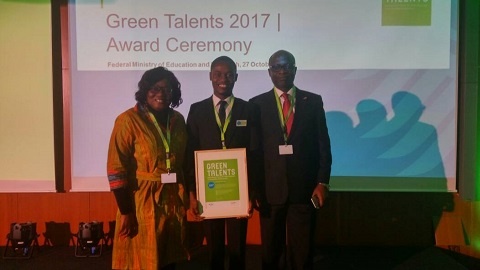
Ghana’s Ambassodor to Germany, Ambassodor Gina Ama Blay (Left) along with Mr Louis Obeng were present at the ceremony in Berlin, Germany to support Eyram Norgbey
Eyram’s research focuses on using industrial waste material to partially replace asphalt binder to make sustainable and cheaper road surfaces, to help reduce the dependence on oil products. In his project, he is modifying asphalt with lignin, a sustainable, renewable and environmentally friendly waste biomass.
Lignin is readily available, as a by-product obtained from the paper-making or corn industry, and about 50 million tons of lignin are produced annually.
Asphalt modification with Lignin will produce cheaper, sustainable and environmentally-friendly composite material for sustainable permeable roads construction development.
Another advantage of using lignin is that it prevents oxidation of asphalt roads over time. Oxidation reduces the lifespan of roads. Lignin is an ideal antioxidant to counteract this problem.
The new bio composite binder material will also be used to make permeable asphalt pavements for road construction in order to help manage floodwater.
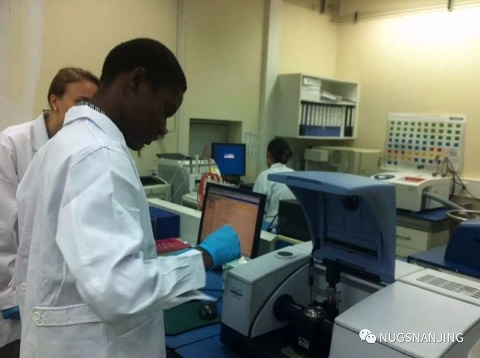
Eyram Norgbey operating a lab equipment with research mates
Eyram’s objective is to investigate the feasibility of adding 20-30 percent lignin to asphalt to produce a bio-composite material with excellent engineering properties for sustainable road pavement and storm water management.
Judged as the best research presenter at San Diego, Califonia, United States at the AEHS Foundation’s conference on soil, Eyram received the prestigious top-prized award in 2016. He is currently on a two-week tour which expires on October 27th in Germany after being nominated among the top 25 up-and-coming scientist out of 602 applicants from over 95 countries.
Their prize is one of the treasured tickets to the “green Talents- international Forum for high Potentials in Sustainable Development.
With the supervision of Prof. Dr. Huang Jingyu, Eyram Dreams to make a similitude of Utopia on earth by replacing asphalt with Lignin.
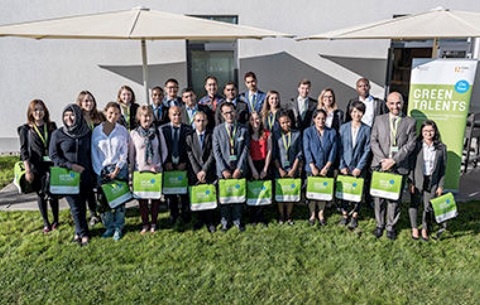
Top 25 Green Talents Awardees from 21 countries
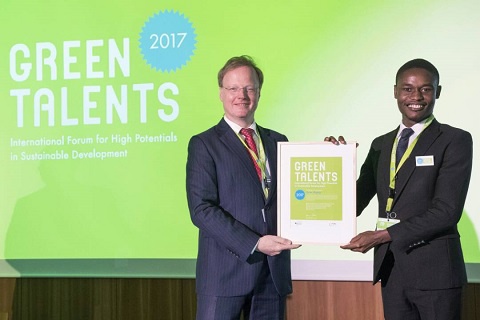
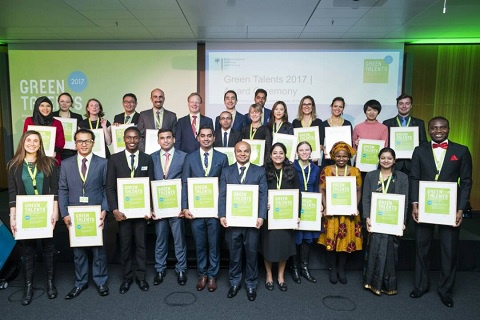
Diaspora News of Sunday, 29 October 2017
Source: Bernard Bekoe Boamah

















